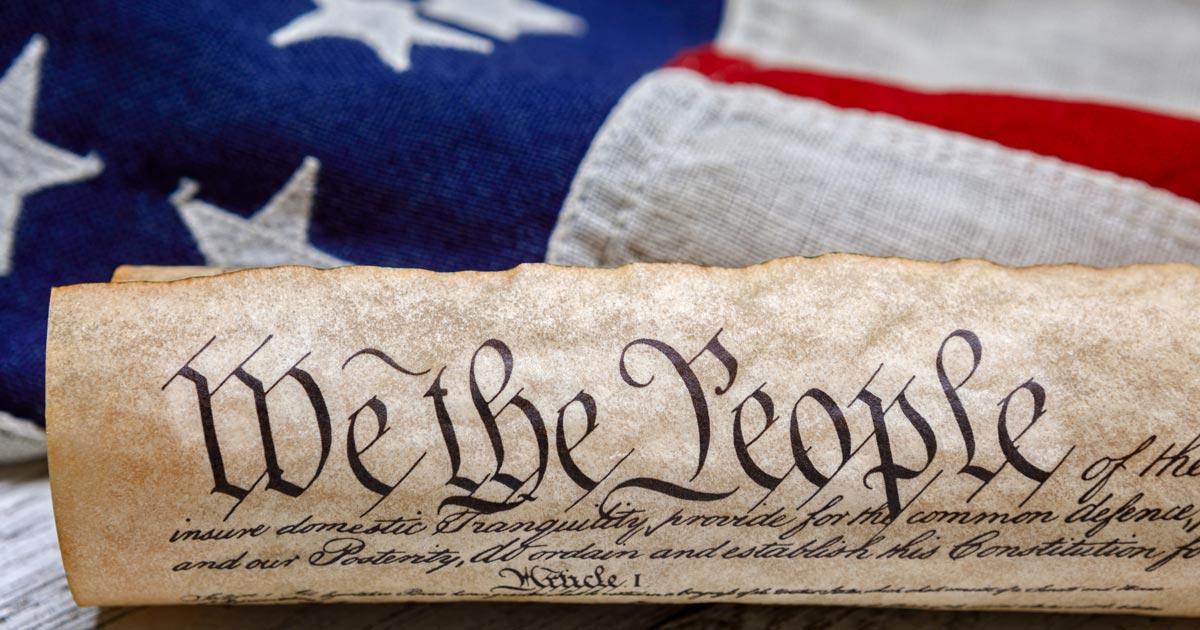 The Constitution had been ratified and was going into effect, and the next great question before the country was the spate of amendments which the Federalists had reluctantly agreed to recommend at the state conventions. Would they, as Madison and the other Federalists wanted, be quietly forgotten? The Antifederalists, particularly in Virginia and New York, would not permit that to happen and the second convention movement, led by Patrick Henry and George Mason in Virginia and proposed by the New York convention circular letter, was the Antifederal goal. Already the circular letter had won approval from Virginia, North Carolina, and Rhode Island. A second convention would reopen the whole question of the Constitution and allow restrictive amendments and alterations which could severely weaken the rampant nationalism of the new government of the United States. For the same reason, a second convention was precisely what the victorious Federalists had to prevent at all costs.
The Constitution had been ratified and was going into effect, and the next great question before the country was the spate of amendments which the Federalists had reluctantly agreed to recommend at the state conventions. Would they, as Madison and the other Federalists wanted, be quietly forgotten? The Antifederalists, particularly in Virginia and New York, would not permit that to happen and the second convention movement, led by Patrick Henry and George Mason in Virginia and proposed by the New York convention circular letter, was the Antifederal goal. Already the circular letter had won approval from Virginia, North Carolina, and Rhode Island. A second convention would reopen the whole question of the Constitution and allow restrictive amendments and alterations which could severely weaken the rampant nationalism of the new government of the United States. For the same reason, a second convention was precisely what the victorious Federalists had to prevent at all costs.
The Federalists, of course, wanted no part of any amendments or reminders of their promises, and Senator Ralph Izard, wealthy Federalist planter of South Carolina, expressed their sentiments at the first session of Congress when he urged his colleagues to forget about their amendments and get down to problems of finance.
James Madison, who defeated James Monroe in the Virginia elections to the House of Representatives and assumed the leadership of the Federalists in Congress, abhorred the concept of a bill of rights. But as a shrewd political tactician, he realized that the second convention movement could swell to formidable proportions. To avoid a potential crippling of the essentials of American nationalism, Madison decided that it was better to make some concessions right away and thus pull the teeth out of the drive for an overhaul of the Constitution before it really got underway. Madison also had a powerful political motive for making such concessions. Antifederalism was powerful in Virginia, as had been demonstrated in Henry’s almost successful attempt to keep the hated Madison out of Congress altogether. If he was to save his political hide in his home state, Madison had to act, quickly, and in his hard-fought election campaign he had pledged to work for such amendments in Congress.
The approximately 210 amendments proposed by the states were of two basic kinds: a bill of rights for individuals and statehood reform to battle federal power. Typical of the former was trial by jury; of the latter was two-thirds requirement for passing a navigation law. The former did not alarm the Federalists nearly as much as the latter, for the former would leave intact a supreme national power, banned only in specific instances from making certain incursions on the perceived liberty of the individual. But the statehood amendments could cut aggressively into the very political and economic vitals of the national juggernaut and battle it effectively from within that power structure itself. The structural amendments would have expanded the libertarian scope of the bill of rights from personal liberties alone to the political and economic. This was too much for the Federalists to swallow.
Madison therefore decided to pass a bill of rights quickly and thus nip in the bud any drive for structural reform and a second convention. He informed Congress that the Antifederal states and a bill of rights was fortunate in that it would be possible to end this threat by granting such a bill without “endangering any part of the Constitution.” If Congress refused to act, the public would be aroused, a second convention would be called, and the opposition could then force “a reconsideration of the whole structure of government.” On the other hand, as he wrote to Thomas Jefferson, submission of a bill of rights would weaken the opposition by splitting the moderates away from the radicals, i.e., “the well meaning from the designing opponents, fix on the latter their true character, and give to the Government its due popularity and stability.”
After Washington’s inaugural speech brusquely warned that amendments must not really weaken the power of national government, Madison introduced amendments that proposed a bill of rights, based on the proposed Virginia amendments and the Virginia Declaration of Rights. Indeed he hastened to assure his intention of submitting the bill-of-rights amendments well in advance in order to forestall the next motion of Virginia’s Antifederal Congressman, Dr. Theodorick Bland, from introducing a resolution for a new constitutional convention. Madison’s centrist action was, predictably, opposed from Left and Right. On the Left, the Antifederal leadership understood Madison’s tactic all too well. Senator William Grayson of Virginia wrote to Patrick Henry that Madison’s amendments greatly overstressed personal liberty at the expense of reform of such matters as the direct-tax power and the judiciary. The whole aspect of Madison’s maneuver, wrote Grayson, was “unquestionably to break the spirit of the Antifederalist party by divisions.” The maneuver succeeded all too well as many in the Antifederal bloc were ready to settle for a small part of the loaf and then give in to the new Constitution. Even George Mason was almost willing to reconcile himself to the new government. In North Carolina, Madison’s introduction of the bill of rights proved instrumental in changing enough Antifederal support to ratify the Constitution. On the other side, many Federalists were unconvinced of the necessity for this maneuver. In the House, Roger Sherman attacked the idea of amendments and upheld stability of government above all else. And the ultra-Federalist Fisher Ames sneered at Madison’s amendment effort as based on research into personal trivia and designed to advance Madison’s personal popularity. Georgia’s James Jackson was already divinizing a constitution not quite a year old. The Constitution, he argued, must be left intact; otherwise, a patchwork flood of amendments might follow. The fact that the Constitution itself was a patchwork seemed to be lost on the Georgia congressman. Perhaps the most extreme expression in the House came from former Judge Samuel Livermore, who had pledged a key vote in ratifying the Constitution in New Hampshire. The judge was outraged about the restraints involved in prohibiting “cruel and unusual punishments” in the bill of rights. Livermore couldn’t understand why necessary and salutary punishments should be prohibited merely because they were cruel.
A gallant Antifederal stand in the House was led by Aedanus Burke and Thomas Tucker of South Carolina. Burke and Tucker urged the inclusion of libertarian structural amendments, such as the prohibition of federal direct taxes, but their efforts were in vain. Tucker also tried in vain to include “expressly” before “delegated” in the Tenth Amendment, thus greatly limiting the power granted to Congress. Finally, after long and reluctant delay, the House passed seventeen restrictive amendments on August 24, 1789.
In the Senate, the libertarian Antifederalist fight was led by the two Virginia Senators, Richard Henry Lee and William Grayson. Lee and Grayson followed the Tucker-Burke path by introducing structural amendments; indeed they introduced a mixture of the amendments proposed by the Virginia convention. They also added a proposal to prohibit federal direct taxes. All of these were rejected by the Senate. The most creative and daringly democratic amendment was to bind representatives to follow the instructions of their constituents, but in all the Senate, only Lee and Grayson had the vision to support it. However, while Lee well understood the Machiavellian political reasons for the amendments, he concluded at the end that half a loaf was better than none. Lee, however, remained highly critical of the way in which his colleagues had inhibited and enfeebled the amendments. The hardline Federalists who scorned any concessions were led in the Senate by Ralph Izard of South Carolina, John Langdon of New Hampshire, and the ineffable Robert Morris of Pennsylvania.
The Senate condensed the House amendments into twelve, and a joint conference committee submitted final revisions of the twelve amendments, which were approved by the Congress on September 25. The hardcore Antifederalists were chagrined; Lee was critical, Grayson bitterly concluded that the submitted bill-of-rights amendments would do more harm than good. Patrick Henry agreed, lamenting the lack of a prohibition of direct taxes, and tried to postpone the ratification of the amendments by the Virginia House. Even the moderate Federalist Thomas Jefferson, though favoring the Bill of Rights, was disgruntled at the lack of a prohibition on government grants of monopoly and a standing army.
Patrick Henry’s gallant fight against the overly soft amendments and the shrewd Madisonian strategy was able to delay Virginia’s ratification until it became the last of the eleven states needed to approve. New Jersey was the first state to ratify in late November 1789, but while nine states moved to ratify by June 1790, Virginia, the last state, took over two years after submission. In Virginia, the struggle was waged between the lower House, now controlled by the Federalists, and the Antifederalist-controlled Senate, which was finally pressured into ratifying on December 15, 1791. Massachusetts, Connecticut, and Georgia never did ratify; Georgia on the high-Federalist belief that they were unnecessary and Connecticut on the equally ultra-Federalist view that any concession would imply that the Constitution was not unflawed perfection, and would therefore give aid and comfort to Antifederalism. In Massachusetts, too, the Federalists wanted no amendments, while the Antifederals held out for stronger amendments; between the two forces, Massachusetts never ratified.
Of the twelve amendments submitted to the states, the first two were not ratified; these were minor provisions dealing with the organization of Congress. The remaining ten amendments composed nine highly significant articles guaranteeing various personal liberties against the federal government, as well as one complementary structural amendment. None of the political and economic liberties desired by the Antifederalists (prohibition of direct taxes, standing army, two-thirds requirement for laws regulating commerce, etc.) were included, but the adopted Bill of Rights was significant enough, and all of their provisions were intensely libertarian.1
The First Amendment provided that Congress “shall make no law” establishing religion or prohibiting its free exercise, abridging freedom of speech, press, or right of peaceful assembly or to petition the government for redress of grievances.
The Second Amendment guaranteed that “the right of the people to keep and bear Arms, shall not be infringed.” While the courts have enumerated the clause to apply only to Congress, leaving the states free to invade this right, the wording makes it clear that the right “shall not be infringed,” period. Since states are mentioned in the body of the Constitution and restrictions placed upon them there as well, this clause evidently also applies to the states. Indeed, the subsequent amendments (three to nine) apply to the states as well as to the federal government; only the First Amendment specifically restricts Congress alone. And yet the courts have emasculated the amendments in the same way, counting them as not applying to the invasions of personal liberty by the states.
The Third Amendment prohibits the quartering of troops in peacetime in a private house without the owner’s consent; the Fourth guarantees the rights of the people “to be secure in their persons, houses, papers, and effects, against unreasonable searches and seizures,” and only specific warrants, not general ones, can be issued.
The Fifth Amendment ensures grand-jury indictments for major crimes, and prohibits double jeopardy, compelling any defendant to testify against himself, depriving anyone of life, liberty, or property “without due process of law,” or confiscating private property without “just compensation.” The Sixth Amendment ensures the right of a defendant to a quick and public trial by an impartial jury of the locality of the crime, and to have various other rights in his trial. The Seventh guarantees the right of trial by jury in civil cases, and the Eighth prohibits excessive bail, excessive fines, and “cruel and unusual punishments.”
The Ninth and Tenth Amendments were signed to give the stark rebuttal to the cynical Wilson-Madison-Hamilton argument that a bill of rights impairs people’s rights by permitting encroachment in unenumerated rights that would supposedly belong to the people. The Tenth Amendment specifies that “the powers not delegated to the United States by the Constitution, nor prohibited by it to the States, are reserved to the States respectively, or to the people.” This amendment specifies that the national government is one of strictly delegated powers, and that powers not so delegated belong to the states or to the people. In other words, the power not specifically delegated or prohibited to the federal government cannot be assumed by that government and are reserved to the states. For many years the Tenth Amendment was the great weapon of the states-rightists and other anti-nationalists in their argument that the states (or the people of the states) are really sovereign, rather than the national government.
This amendment did in truth transform the Constitution from one of supreme national power to a partially mixed polity where the liberal anti-nationalists had a constitutional argument with at least a fighting chance of acceptance. However, Madison had cunningly left out the word “expressly” before the word “delegated,” so the nationalist judges were able to claim that because the word “expressly” was not there, the “delegated” can vaguely accrue through judges’ elastic interpretation of the Constitution. This loophole for vague “delegated” power allowed the national courts to use such open-ended claims as general welfare, commerce, national supremacy, and necessary and proper to argue for almost any delegation of power that is not specifically prohibited to the federal government—in short, to return the Constitution basically to what it was before the Tenth Amendment was passed. The Tenth Amendment has been intensely reduced, by conventional judiciary construction, to a meaningless tautology.
Ironically, the most potentially explosive weapon of the anti-nationalists was ignored then and for the next 175 years by the public and the courts. This was the Ninth Amendment, which states: “The enumeration in the Constitution, of certain rights, shall not be construed to deny or disparage others retained by the people.” With its stress on the rights of the people, rather than on state or federal power as in the Tenth Amendment, the Ninth Amendment is even more acutely the answer to the Wilsonian argument than the Tenth. The enumeration of rights may not be so construed as to deny other unenumerated rights retained by the people.
The Ninth Amendment has unfortunately (a) erroneously been held to apply only to the federal government and not also to the states, and (b) has been reduced to a simple paraphrase of the Tenth Amendment by the courts. But then why have a Ninth Amendment that simply repeats the Tenth? In truth, the Ninth Amendment is very different, and no construction can reduce it to a tautology; unlike the formulaic Tenth Amendment, the Ninth emphatically asserts that there are rights which are retained by the people and therefore may not be infringed upon by any area of government. But if there are unenumerated rights, this means that it is the constitutional obligation of the courts to find, proclaim, and protect them. Moreover, it means that it is unconstitutional for the courts to allow a government infringement on any right of the individual on the grounds that no express prohibition of that act can be found in the Constitution. The Ninth Amendment is an open invitation—nay, a command—to the people to discover and protect the unenumerated rights and never to allow governmental invasion of rights on the ground that no express prohibition can be found. In short, the Ninth Amendment expressly commands the judge to be “activist” and not “literal” in the construction of rights retained by the people against government encroachment.
Moreover, if it is asked what “other rights” were intended, the context of the time dictates but one answer: they meant the “natural rights” held by every human being. But a commandment that the courts are duty-bound to protect all of man’s natural rights, enumerated or retained, would reduce the powerful scope of government action to such a degree as to give the last laugh to Herbert Spencer over Justice Oliver Wendell Holmes, who was in the early twentieth century to twist the strict constitutional judges of their day from holding that the Constitution endowed the individualist-libertarian social philosophy of Spencer’s Social Statics (1851). While the taunt was directed against enabling the judges’ personal preferences into Fundamental Law, the spelling out of the implications of the Ninth Amendment might well reinstate Social Statics, and on a far firmer legal and constitutional basis.2
Misconstrued as it was, the Ninth Amendment lay forgotten and made no impact whatever on American history until the year 1965. Then, suddenly, the Supreme Court, in a landmark of constitutional law, rediscovered the lost amendment and relied on it in Griswold v. Connecticut (1965) to prohibit the states from interfering with the individual’s “basic and fundamental” right to marital privacy (in outlawing birth-control devices). The enormous implications of the decision for constitutional law and for wider liberty in the U.S. were adumbrated in the concurring opinion of the Justice Arthur Goldberg (agreed to by the Justice William Brennan and Chief Justice Earl Warren):
The concept of liberty protects those personal rights that are fundamental, and is not confined to the specific terms of the Bill of Rights. My conclusion that the concept of liberty is not so restricted, and that it embraces the right of marital privacy, though that right is not mentioned explicitly in the Constitution is supported both by numerous decisions of this Court, referred to in the Court’s opinion, and by the language and history of the Ninth Amendment….
The Ninth Amendment to the Constitution may be regarded by some as a recent discovery, and may be forgotten by others, but, since 1791, it has been a basic part of the Constitution which we are sworn to uphold. To hold that a right so basic and fundamental and so deep-rooted in our society as the right of privacy in marriage may be infringed because that right is not guaranteed in so many words by the first eight amendments to the Constitution is to ignore the Ninth Amendment, and to give it no effect whatsoever. Moreover, a judicial construction that this fundamental right is not protected by the Constitution because it is not mentioned in explicit terms by one of the first eight amendments or elsewhere in the Constitution would violate the Ninth Amendment….
Rather, as the Ninth Amendment expressly recognizes, there are fundamental personal rights such as this one, which are protected from abridgment by the Government, though not specifically mentioned in the Constitution.3
This passage is excerpted from Murray N. Rothbard’s Conceived in Liberty, vol. 5, The New Republic: 1784–1791.
- 1. [Editor’s footnote] Merrill Jensen, The Making of the American Constitution (Princeton, NJ: D. Van Nostrand Co., 1964), pp. 148–49, 184–86; Robert Allen Rutland, The Birth of the Bill of Rights, 1776–1791 (Chapel Hill: University of North Carolina Press, 1955), pp. 190–218.
- 2. [Editor’s footnote] Rothbard elsewhere wrote that Spencer’s Social Statics was “the greatest single work of libertarian political philosophy ever written.” Murray Rothbard, “Recommended Reading,” The Libertarian Forum (June 1971): 5. Rothbard is referring to the famous case of Lochner v. New York (1905), which overturned a maximum-working-hours law on the principle that it violated freedom of contract. In his dissenting opinion, Holmes wrote that “the Fourteenth Amendment does not enact Mr. Herbert Spencer’s Social Statics.”
- 3. Preceding the notable decision was the first treatise ever written on the Ninth Amendment, rediscovering this part of the Constitution as a particular bastion of individual liberty: Bennet B. Patterson, The Forgotten Ninth Amendment (Indianapolis, IN: Bobs-Merrill, 1955). Patterson accepts the thesis that Amendments two through eight apply only to the federal government. [Editor’s remarks] U.S. Reports: Griswold v. Connecticut, 381 U.S. 479 (1965), pp. 486–87, 491, 496.
Tags: Featured,newsletter






















